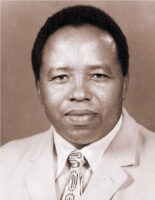Eliud Timothy Mwamunga was an astute politician in post-independent Kenya, navigating turbulent political waters to serve in the Cabinets of Presidents Kenyatta and Moi. He later co-founded the Democratic Party of Kenya (DP) that would play the initial role in catapulting Kibaki to become Kenya’s third President.
A wealthy landowner in a constituency endowed with minerals, cash crops and wildlife, Mwamunga courted the Kenyatta and Moi administrations by not only rising above other political greenhorns in Taita-Taveta and the Coast, but also playing low-profile politics at a time when the careers of abrasive and combative politicians were brutally cut short through detention, sacking from the Cabinet or rigging out of Parliament.
A lawyer, Mwamunga made history not just in Voi constituency, but also in the larger Taita-Taveta by serving as the MP for 20 uninterrupted years. None of those who came before or after him — Basil Mwakiringo, Darius Mbela, Boniface Mganga or Adiel Kachila — managed to serve for even two terms.
Mwamunga was born on July 21, 1935, at Ishamba at the foot of the Taita Hills. He grew up in an area endowed with natural resources — minerals such as rubies, cash crops (sisal) and fruits (mangoes) and wildlife as the Tsavo National Park is nearby. He attended Ishamba Primary School and later joined Shimo-la-Tewa Secondary and Alliance.
He went for higher education at Makerere and then the University of Dar-es-Salaam in to study law. If Makerere was the educational Mecca of Eastern Africa, Dar-es-Salaam was the premier law institution in the region. After graduating in law, Mwamunga taught in various schools in Coast Province at a time when the struggle for independence was at its height. The Mau Mau war was in top gear, the State of Emergency had been declared in 1952 and leaders were forming political parties to agitate for independence.
At the Coast, the kingpin of that political struggle was Ronald Ngala, a major inspiration for the young teacher. Ngala, who was against the marginalisation and exploitation of the Coast people, played a central role in the struggle for independence.
The independence constitutional conferences in London, the 1963 elections pitting Kanu against Kadu, and the dissolution of Kadu in 1964 were some of the exciting political events of the freedom struggle, independence and the birth of the young nation that inspired a young Mwamunga even as he taught at the Coast and later became the Taita-Taveta County Clerk.
As Town Clerk, Mwamunga rubbed shoulders with civic leaders and parliamentarians. He also visited all parts of Taita-Taveta and realised the dire need for basics among his people. It was also during that period that he discerned the role he could play in serving the Taita people.
In 1969, at the age of 34, he contested and won the Taita-Taveta parliamentary seat. In his first term in Parliament, Mwamunga initiated numerous development projects, made useful connections with agriculturalists, wildlife conservationists and mineral prospectors, including wealthy Kenyans and foreigners who could exploit the district’s natural resources.
